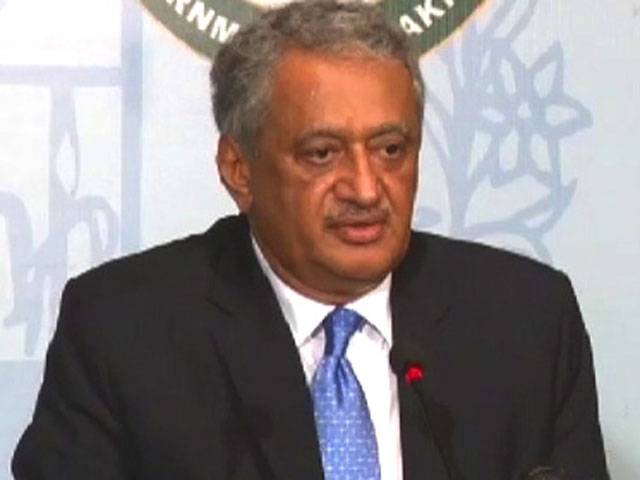ISLAMABAD - Pakistani and Afghan leaders are going to meet today to draft a new ‘roadmap’ to kick-start the stalled peace process between the Afghan government and Taliban.
Foreign Office spokesman Qazi Khalilullah confirmed Prime Minister Nawaz Sharif would meet Afghan President Ashraf Ghani in Islamabad during the Heart of Asia conference to overcome distrust and push for new talks between Kabul and the Taliban leadership.
Ghani’s election as president in 2013 raised hopes for an improved relationship between Kabul and Islamabad after he announced Afghanistan would not favour India against Pakistan.
Peace talks between his government and Taliban were mediated by Pakistan and appeared progressing until it emerged insurgency leader Mullah Omar had died in 2013. The talks, which were held in Murree and included Chinese and American representatives, were suspended amid Afghan suspicions that Pakistan was aware of the Taliban leader’s death, but did not share the information with Kabul.
Since then both the sides have been accusing each other of harbouring anti-government terrorist groups in a downward spiral of mutual recrimination.
A breakthrough was made during the last week’s climate change conference in Paris where Nawaz Sharif met Ashraf Ghani and persuaded him to attend the Heart of Asia conference, meet on its sidelines to rebuild their relationship and push for a new Afghan peace process.
China, the United States, Russia, Britain and India will also take part in the conference, but prospects for progress depend on cooperation between Kabul and Islamabad.
“A roadmap for resumption of reconciliation process in Afghanistan is on the agenda of meetings of Pakistani and Afghan leaders,” Foreign Office spokesman Qazi Khalilullah told The Nation.
Strategic analysts welcomed the development, but voiced caution over the prospects of a speedy resumption of talks with the Taliban. “It is a good development that Pakistani and Afghan leaders will meet to discuss peace in Afghanistan,” said Pakistan’s leading security expert, Ikram Sehgal. He questioned whether the two countries would reach an agreement on a roadmap. Pakistan wanted peace in Afghanistan, but faced lingering suspicions of interference in that country, he said.
Institute of Strategic Studies Research Director Najam Rafique also doubted there would be a rapid progress. “It all depends on the response of the Afghan president to international efforts,” he said.
Pakistan yesterday reassured Afghanistan of its good intentions when Prime Minister Nawaz Sharif and Chief of Army Staff General Raheel Sharif agreed Islamabad would not seek a mediation role in any future peace talks unless invited by President Ghani.
The meeting was attended by National Security Adviser Lt-Gen (r) Nasser Khan Janjua, Finance Minister Ishaq Dar, Interior Minister Ch Nisar Ali Khan and Adviser on Foreign Affairs Sartaj Aziz. They were briefed by Janjua on a recent meeting with his Indian counterpart and discussed a strategy to deal with Indian External Affairs Minister Sushma Swaraj who arrived in the capital last night.
The sources close to the prime minister said he wanted good relations with India and was ready to discuss all disputes, including Kashmir.
Both Ashraf Ghani and Sushma Swaraj are likely to have meetings with the prime minister today. Senior officials said they hoped the Heart of Asia conference would culminate in a declaration to outline the path to new peace talks. Afghan Deputy Foreign Minister Hikmat Khalil Karzai said the spectre of Daesh or Islamic State had given a new impetus to the search for a solution.
“The Daesh threat once again reminds us of the gravity of the problem and demands unity to counter the menace of terrorism and extremism,” he asserted.
Sartaj Aziz said major security challenges were hampering economic development in Afghanistan. “Instability in Afghanistan is not in Pakistan’s interest,” he added.
Foreign ministers and high-ranking delegations from 14 participating states, 17 supporting countries and 12 international and regional organisations have confirmed their participation in the two-day conference.
Friday, April 19, 2024
Nawaz, Ghani to give peace talks another shot

Parvez Elahi’s indictment delayed again in two cases
April 19, 2024
SC suspends ECP’s re-polling order in PP-51
April 19, 2024
Court approves plea bargain of Parvez Elahi’s co-accused
April 19, 2024
Zardari creates another parliamentary record
April 19, 2024
KP politicians, civil society laud President’s address
April 19, 2024
A Tense Neighbourhood
April 19, 2024
Dubai Underwater
April 19, 2024
X Debate Continues
April 19, 2024
Hepatitis Challenge
April 18, 2024
IMF Predictions
April 18, 2024
Kite tragedy
April 19, 2024
Discipline dilemma
April 19, 2024
Urgent plea
April 19, 2024
Justice denied
April 18, 2024
AI dilemmas unveiled
April 18, 2024
ePaper - Nawaiwaqt
Advertisement
Nawaiwaqt Group | Copyright © 2024





